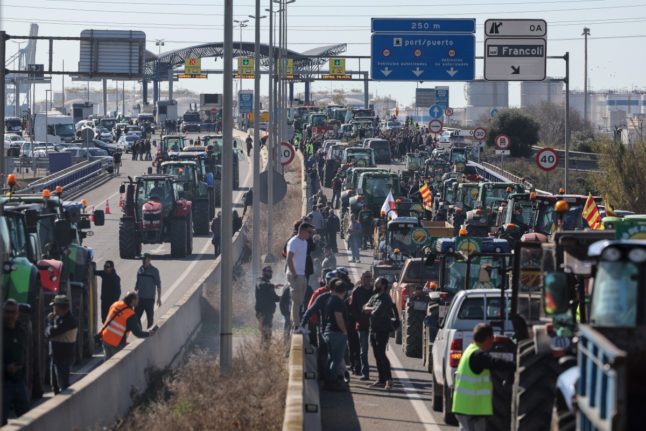The demonstrations followed an earlier string of farmers’ protests that struck various European countries in recent weeks, including Italy, France and Belgium.
Several hundred tractors from across the region converged on the access roads leading to Tarragona port about 100 kilometres (60 miles) south of Barcelona as widespread agricultural protests entered their second week.
Further north, near the border with France, demonstrators blocked part of the AP-7 highway some 30 kilometres (17 miles) north of Girona, stopping traffic with their tractors, erecting barricades and torching dry branches.
READ ALSO: EXPLAINED: Why are farmers in Spain protesting?
Elsewhere, just over a dozen tractors blocked an access road leading to Mercabarna, Barcelona’s main wholesale market for fresh produce in the south of the city.
Tuesday’s protests, scattered across this region of eight million residents, were focused on the “unfair competition” from products imported from countries “not required to meet European standards”, said a statement from the Pagesos union which called the demos.
As in other European countries, angry farmers have been protesting over rising costs, high fuel prices, bureaucracy and the environmental requirements in the EU’s Common Agricultural Policy (CAP) and its forthcoming “Green Deal”.
READ ALSO: How long will the farmers’ roadblocks in Spain last?
Spain is one of Europe’s leading producers of fruit and vegetables but its farms have has suffered from a lack of rainfall that has plagued the Iberian Peninsula for the last three years. Droughts are exacerbated by human-caused climate change.
Last Wednesday, Catalan farmers turned out en masse with nearly 1,000 tractors converging on Barcelona to put their demands to the regional
government.
The latest demonstrations, which have rumbled on for just over a week, will once again be stepped up on Wednesday when various agricultural organisations
have called farmers to hit the streets across the country.
On February 21 they are planning a huge demonstration outside the agriculture ministry in Madrid.



 Please whitelist us to continue reading.
Please whitelist us to continue reading.
Member comments